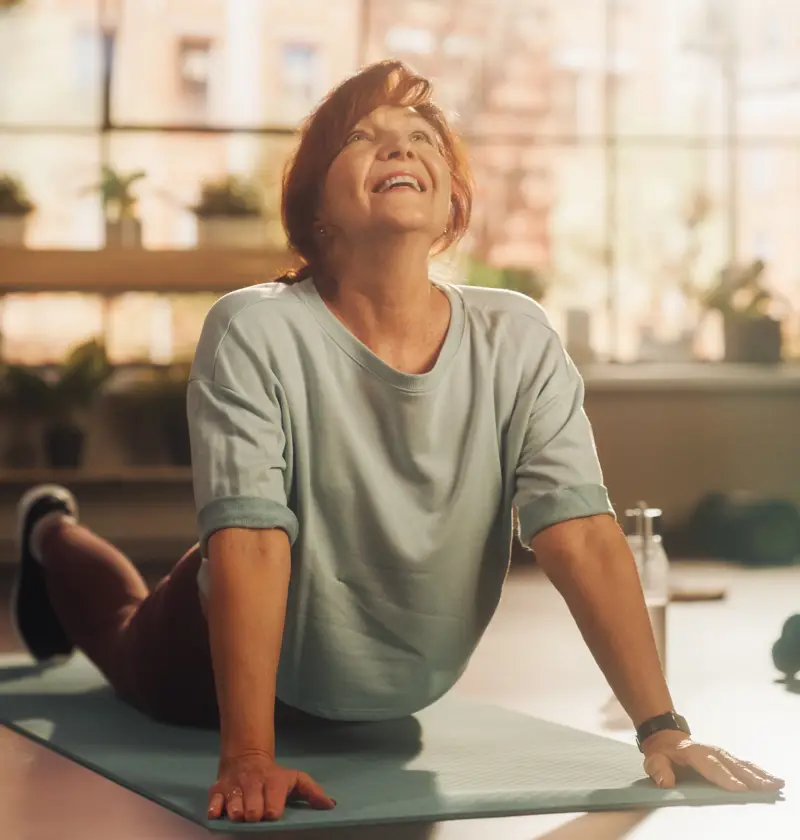Take action now to protect and improve your health
When you are looking after someone else and juggling multiple demands, it’s all too easy to ignore your own health. But, when you’re under pressure and youth is no longer on your side, then taking care of yourself is even more important.
It can often seem like we are bombarded with health advice – and even more so as we grow older – so what are the priorities?
As the years progress, the key to good health is ensuring that you:
- Move more
- Eat well
- Avoid poisoning your body
- Act early to manage any health risks
Move more
You don’t have to get a personal trainer, run a marathon or go to the gym. As the saying goes, every little helps and small changes can make a big difference.
Why bother?
Moving more is proven to help you:
- Reduce your risk of serious health conditions including cancer, heart disease and diabetes
- Help your mental health by lowering stress levels, increasing your energy and making you feel happier
- Improve muscle and bone health so that you age better and can be more likely to remain independent in later life
How much movement is necessary?
The national health chiefs recommend that you should aim to be physically active every day so that you complete at least two and a half hours of exercise per week.
The guidelines might sound daunting but not when you realise that walking briskly for just one minute counts as exercise.
You can also become much fitter simply by sitting less and standing more. Just standing to iron, prepare meals or wandering while you talk on the phone can help. Sitting burns 60-130 calories per hour but standing can double this burn rate.
Practical tips to help you move more
- Go for a walk while waiting for your loved one to get dressed/finish in the bathroom etc
- Focus on hydration – get up and make a drink every hour
- Walk or stand whenever you need to make a phone call
- Set hourly standing or walking reminders on your phone and either stand up, march on the spot or walk around the room (taking in a flight of stairs is even better) when the alarm sounds
- Walk around the room while waiting for your food to cook, brushing your teeth or watching TV.
Eat Well
What you eat impacts on your energy levels, your mood, your health and your risk of developing serious illnesses.
There is almost too much advice about healthy eating to digest, and the right advice will depend on how heavy you are for your height (as measured by BMI), your health and any medical problems, your activity levels and your age.
However, there are some common principles which apply to most people:
- Avoid too much sugar and salt
- Get plenty of fruit and veg (at least 5 a day)
- Limit high-fat foods like processed meats and pastries
As we get older – over 65 years – we need to be more careful about eating plenty of protein (which is essential to build and maintain muscle strength) and essential vitamins & minerals especially: calcium for healthy bones, folate (folic acid) and vitamin B12 for energy and health.
Vitamin D supplements are also important for healthy bones, muscles and teeth. The UK government recommend that we should all take supplements during the winter although there might also be some benefit during the rest of the year too. The recommended dose is 10micrograms (400 IU) each day. Vitamin D3 is usually best although people following a vegan diet may find vitamin D2 more useful.
“Health is a priceless wealth – invest while you can” (Bryant McGill)

Avoid poisoning your body
Stop smoking
Smoking harms nearly every organ of the body.
It causes lung cancer, respiratory disease and cardiovascular disease, as well as many cancers in other organs including lip, mouth, throat, bladder, kidney, stomach, liver and cervix.
Smoking significantly raises the risk of developing type 2 diabetes, eye disease and dementia. It also affects bone health increasing the risk of osteoporosis, bone fractures, back pain and degenerative disc disease.
Research shows that expert support from a local stop smoking service gives smokers the best chance of quitting for good – this approach is 3 times more effective than trying to quit without any help. You can find out about your local stop smoking service from community pharmacies and GP surgeries. These services are free and offer a choice of one-to-one or group behavioural support from a trained stop smoking advisor, together with prescriptions.
There is a wide range of stop smoking aids available, including:
- Nicotine replacement therapy (NRT) products such as patches, sprays, lozenges and gum
- e-cigarettes (vapes) – nicotine-containing E-cigarettes are around twice as effective as NRTs such as patches and gum. Health leaders agree that although e-cigarettes are not risk-free, they are far less harmful than cigarettes because most of the poisonous chemicals contained in tobacco smoke, eg tar and carbon monoxide, are not in e-cigarette vapour
- Prescription tablets Varenicline (Champix) and Bupropion (Zyban) – these double your chances of quitting.
Safe drinking
Research shows that some carers use alcohol as a coping mechanism. Although this is understandable in the face of stress and isolation, it is not healthy.
Too much alcohol increases the risk of all sorts of illnesses including cancer, dementia, or stroke.
Excess drinking can also contribute to feelings of depression and anxiety, whilst making stress harder to deal with. Alcohol also contributes to weight gain, generating lots of empty calories.
Recommended levels of “safe drinking” are now the same for men and women – maximum of fourteen units per week. That is the equivalent of 6 pints of average-strength beer, or 6 medium glasses of average strength wine.
Manage your health risks
As we get older, we have a higher risk of developing conditions like high blood pressure, heart disease, type 2 diabetes and some cancers.
So it becomes increasingly important to attend health checks and screening appointments to ensure that any emerging problems can be diagnosed and managed as soon as possible.
For most medical conditions, prevention really is better than cure.
A free NHS Health check
This check is free for people aged between 40 and 74 (unless they already have a circulatory problem) and aims to prevent cardiovascular disease, and associated conditions, with early diagnosis and care.
Local authorities have a legal responsibility to offer an NHS Health Check to those eligible, every five years.
Free Screening tests
The NHS currently runs a number of free programmes to identify people who have a higher chance of having a health problem, so that they can get the right help as soon as possible.
The type of screening available depends on your age, gender and health – details of the various programmes and schedules is available here.
Sight and hearing checks
Vision or hearing impairment can become more common as we age and, unless addressed, they can increase our risk of developing dementia. Read more about sight checks or hearing loss
Long term medical conditions
If you already have an ongoing problem then take care to follow any medical and lifestyle advice as this will help to reduce the risks of the disease progressing as the years go by.
Free vaccinations
It’s important that vaccines are given on time for the best protection this NHS link will help you see which immunisations you need and when.
Get help for your health
Helping you move more
The NHS has plenty of advice to help anyone start to move more
The NHS App Active 10 can help you increase the number of steps you take each day and build just 10 minutes of brisk walking into your daily routinE
The “We are undefeatable” website helps people with ongoing conditions find suitable activities
Helping you eat well
The British Dietetic Association has great information about eating well at any age and with a wide range of health conditions
The British Nutrition Foundation provided trusted information
Helping you drink safely
This NHS resource has practical suggestions
Alcohol changer website can help you explore safe drinking



